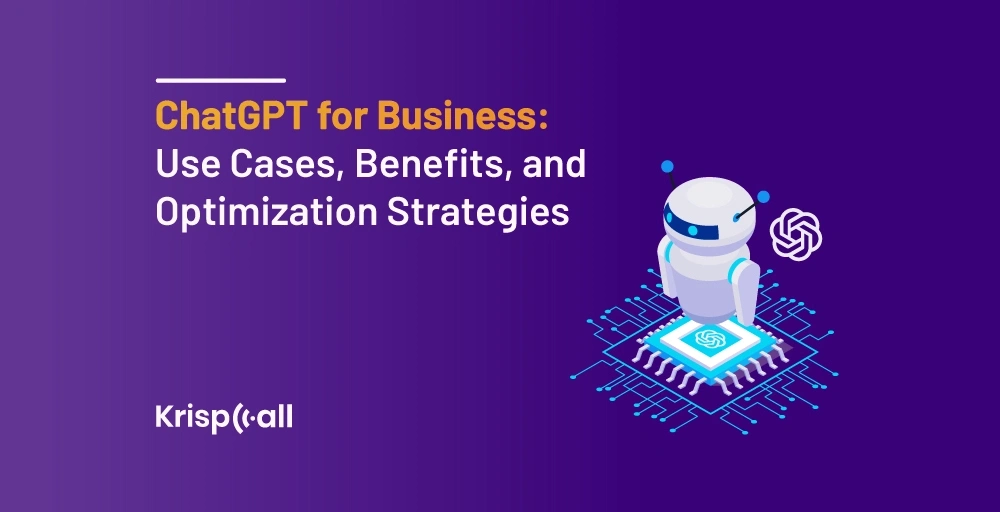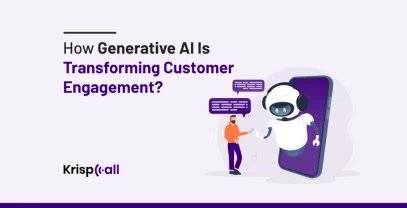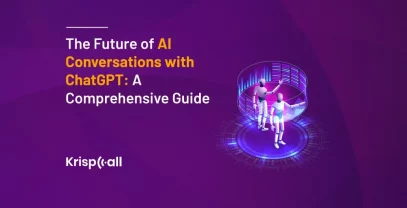A lot of things are becoming feasible now, thanks to the advancement in Artificial Intelligence – using ChatGPT for business is increasingly popular since more and more people have realized its application.
Despite the potential to accelerate task accomplishment and the efficiency of employees and individuals, several sub-organizations remain unaware of the numerous possibilities of applying ChatGPT to improve commerce and productivity.
The technology can be used for different reasons like customer relations, coding, and even composing an email. However, its application is not limited to the above-mentioned.
In this blog, we will talk about what ChatGPT is, how can you use ChatGPT for business, its benefits, and many more.
🔑Key Highlights
- ChatGPT is conversational AI that can be used to respond to multiple questions and queries by processing big data gained from the internet through the help of machine learning, Natural Language Processing, and Large language model techniques.
- ChatGPT has many benefits for a business, including customer support, content creation, marketing, advertisement, and more.
- Cost-effectiveness, 24/7 availability, customer satisfaction, a more effective team, and ease of understanding are the benefits of ChatGPT for businesses.
- Using ChatGPT integration into existing systems and processes, businesses can extract, gather, and analyze large datasets, allowing them to make better decisions and alter their business model as a whole.
What is ChatGPT?
ChatGPT is a conversational AI developed by OpenAI that uses large language models and generative predefined models to create human-like conversational dialogue. It uses natural language processing to have human-like conversations and do activities such as writing emails, programming, essays, and more.

Consider it more of an enhanced version of the web-based auto-response mechanism that has the capability to answer users’ queries. It is more flexible than other AI systems as it seems to have been trained thoroughly with many data sets and can produce completely original answers to text-based questions.
Since it is very flexible and highly versatile, ChatGPT can be applied in several fields and several activities; AI can be applied for customer service. translation, and content creation amongst others.
As for ChatGPT’s offering, it tries to place computers and machines in a context where it is possible to use the machine more effectively in relation to the exchange of information in a number of situations.
What Are The Benefits Of Using ChatGPT For Business?
ChatGPT and other generative AI tools offer numerous benefits for businesses across various use cases:
1. A More Effective And Successful Team
With the help of ChatGPT, companies can carry out several tasks at one time, develop reports, and process multiple requests from customers at a time, all these without the need for hiring more staff. This can lead to better prioritization where the more productive areas of the employee’s expertise are directed towards higher-value practices and processes.
ChatGPT can also be used in performing tasks such as order monitoring, appointment scheduling, and simple problem-solving. Thus, it aids businesses in achieving their objectives and ultimately improves productivity.
2. Increase Customer Satisfaction
Using the ChatGPT technology to build Customer Relationships, the companies are presented with the opportunity to provide specific and ever-changing experiences to the consumers. This smart AI is capable of engaging with the consumers, recommending the right products, and guiding the consumers upon their purchase process.
Given that ChatGPT is an AI-based solution equipped with an understanding of natural language processing, the system is capable of engaging in recognizable human-like conversations with customers, which in turn can lead to increased satisfaction levels in the customers.
3. 24/7 Availability
ChatGPT is available 24 hours a day to assist customers. This makes it possible for the business to be able to support its customers as well as address the issues that the customers may have, which in the long run helps in increasing customer loyalty as well as customer retention.
The use of ChatGPT as a tool in the management of customer support means that many businesses can automate some of their procedures. Through routine and repetitive activities, ChatGPT can reduce the work of the human agents and allow them to focus on other essential tasks that add more value.
4. Cost-Effective
ChatGPT also offers businesses an opportunity to reduce costs associated with customer help. A few support jobs, such as answering frequently asked questions, are ones that can easily be handled by computers with ChatGPT, and thus, human resources can be left free to handle the more complex work.
Thus, this leads to a resource-optimized customer service team, in which human staff members can address more complex questions, be involved in different exceptional situations, and have individual consultations. It can therefore be seen that this approach not only helps in decreasing the operational costs but it also helps in improving the customer satisfaction levels.
5. Easy To Understand and Use
ChatGPT is an effective tool that can be easily integrated depending on one’s desire. Due to the simple command structure and lack of algorithmic programming as the essential feature of ChatGPT, it can be introduced and used by people with different levels of expertise and, therefore, does not need additional training in the application of the software.
ChatGPT is a powerful solution that can benefit small businesses and assist them in achieving their goals. Thus, with this technology, small organizations can reduce workload as staff can gain proficiency in the work processes done by experts, improve organizational performance, and still hold a strategic, efficient, and effective business stature.
Best Use Cases of ChatGPT for Business
ChatGPT has numerous use cases in business across various departments and functions. Here are some examples:
1. Customer Service
ChatGPT can be used to answer customers’ queries at the moment, solve or identify basic problems, and help on any inquiries related to a product or service. It can accommodate a large variety of requests, thus leaving assisted agents to deal with complex problems only.
Customer support has been revolutionized by ChatGPT and it increases customers’ engagement by integrating with current systems and supporting human efforts.
2. Content Creation
Through the use of ChatGPT, there is an opportunity to increase the quality of writing blogs, websites, and different types of marketing materials. It can be helpful for copywriters and content marketers as it demonstrates drafts, ideas, and advice on how to make it better.
This is especially the case for those clients who only need help in finding out the ideas and organization of the essay and are already familiar with what the topic of the given essay would be about.
3. Marketing and advertising
ChatGPT can help businesses create targeted and engaging ad text and email marketing campaigns. Using its natural language processing skills, this AI productivity tool can develop interesting content that resonates with the target audience, raising click-through rates and conversions.
ChatGPT can improve customer engagement and assistance by automating consumer interactions and responses on websites and social media platforms. By getting engagement it can also help with creating email marketing campaigns and persuasive ad copy.
4. Economical approach to extending specific steps
ChatGPT can be a cost-effective alternative for firms wishing to expand specific steps in their processes, especially in software development. ChatGPT can help businesses save time and costs by automating common operations like code optimization, bug repair, and testing.
Without needing a lot of human labor, ChatGPT can help with lead qualification and nurturing, streamlining the sales pipeline.
5. Financial services and investment
With actual-time huge data analysis capacities provided by emerging machine learning techniques, enlightening financial decisions are becoming potential and moreover, the advanced chatbots are created. Chatbots are also useful in achieving the financial planning process since they can offer specific advice for the financial goals, risk appetite, and investment choices of an individual.
In the field of finance and investment, ChatGPT is a multi-talented innovation whose function is to automate processes, provide individual recommendations, and generate reports and analyses that would facilitate improved operations for both clients and the company.
6. Writing and proofreading emails
ChatGPT is a useful tool for businesses regarding the capability of enhancing email communication and proofreading services. With the ability of ChatGPT to make use of Language Processing tools, it becomes possible to write concise emails that would appeal to the targeted clients.
ChatGPT comes in handy as it can be utilized by various companies to ensure that their emails do not contain typographical and grammatical issues and peculiar phrasing. Companies may sustain a caring and professional experience within their email correspondence due to ChatGPT’s text analyzing and improving inputs.
How To Get Even More From Generative AI?
Generative AI has emerged in a relatively short period of time as a game-changer in a number of industries owing to the unprecedented opportunities it creates in areas related to content generation, data production, etc. Nevertheless, there is much more potential yet to be discovered and in order to do so, you need to get started with the below-mentioned tactics.
1. Re-evaluate and Recast Procedures
Reevaluation and recast procedures are important for this purpose. This means re-evaluating the previous strategies employed to extract the maximum out of generative AI, therefore evaluating its efficiency. It is the process of changing these methods, depending on the reevaluation process done above. This may entail employing a different training dataset, fine-tuning the learners, or employing altogether a different learning technique.
In order to fully leverage the potential that generative AI can offer businesses and industries, it is advised to implement such models in an iterative process that leads to continuous improvement and prosperity.
2. Use Effective Prompts
Effective prompts are very important when it comes to getting the best out of generative AI. It is crucial to be as detailed as possible when outlining prompts on how to get more out of generative AI. Such prompts could, for example, include fine-tuning model parameters, exploring new data augmentation techniques, or designing complicated feedback loops.
Users can direct the generative AI to generate outputs that are relevant to the users’ intentions and specifications by providing clear and precise stimuli. Not only does this enhance the quality of the produced outputs but it also enables users to get insights and recommendations from the AI-generated content.
3. Concentrate on Resolving The Issue
The key to unlocking generative AI’s true potential lies in a problem-solving mindset. Instead of getting caught up in the novelty of the technology, focus on the specific task or challenge you need to address.
Generative AI can help solve specific problems, such as repetitive design tasks or personalized marketing copy. By focusing on the problem first, AI becomes a tool that enhances human abilities instead of replacing them. This approach ensures that AI is used strategically and effectively.
4. Adopt Ethical AI procedures
To fully embrace and maximize on the benefit of generative AI, ethical AI must be implemented fully. However, this must be done in such a way that the formulation, implementation and deployment of the AI models is ethical.
An understanding of the logic behind the AI’s decisions makes them trust its output more and also enables them to spot any possible bias in the content generated by the AI. By following ethical practices of generative AI, we can harness the incredible capabilities of generative AI while avoiding any detrimental effects on society.
5. Incorporate Design Concepts Into Interactions
Design principles should be implemented in human-machine interfaces to enhance the possibilities and capabilities of generative AI. With the help of such an approach and following the guidelines of user experience design, companies can develop clear and accessible interfaces that allow them to interact with AI solutions effectively.
Applying design thinking methods helps to build an emotional connection with the customer, define what they like or do not like about AI interfaces and make the interaction with the technology as convenient as possible. Applying design principles to the conversations between people and computers, corporations increase user delight and adoption and create new value for generative AI markets and industries.
🕵️♂️You might find this interesting: Artificial Intelligence Call Center: How AI is Transforming Call Centers
Conclusion
ChatGPT has been proven to be highly effective in various business applications due to the various opportunities it provides for different fields. Companies can extract, gather, and analyze large data sets, which allows them to make better decisions and alter the business model as a whole with the help of ChatGPT integration into the company’s existing systems and processes.
It can be designed with the requirements of every business field in mind and, therefore, is an incredibly useful tool for implementing generative AI for any business. By consulting with professionals, it is possible to maximize the benefits of using ChatGPT and achieve success in a particular market sector.
Thus, it can be stated that the businesses that implement generative AI concepts will be ready to seize more opportunities and be more prepared for an even more digital and data-reliant future.





